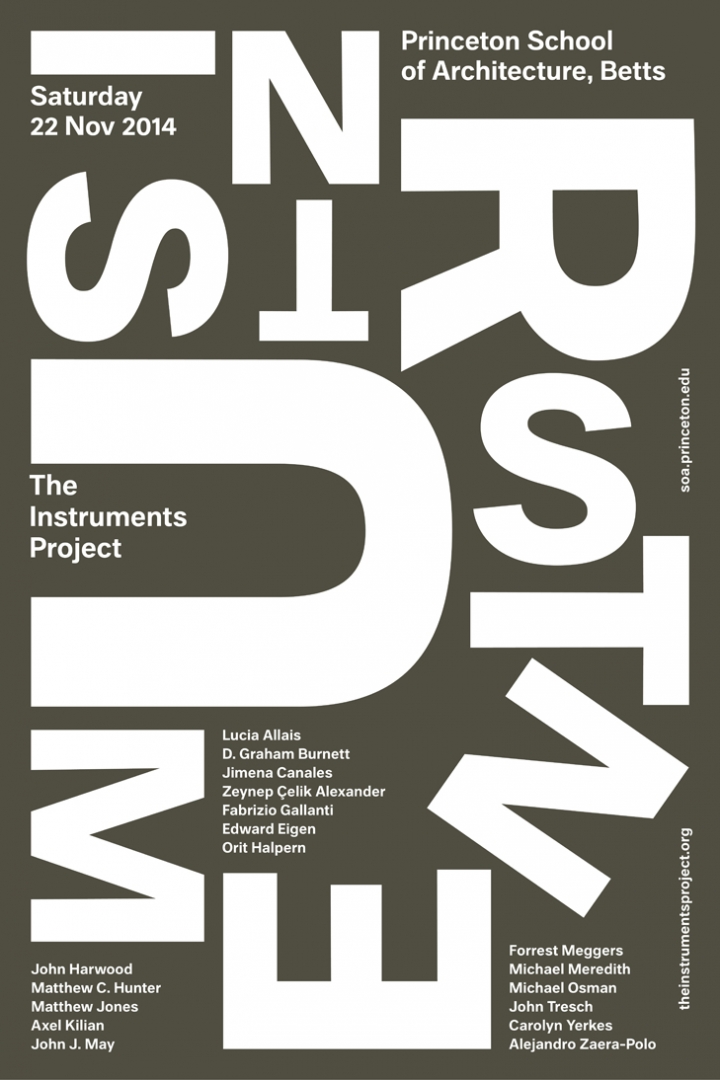The Instruments Project: Princeton Conversations
The Instruments Project is a research project that examines the philosophical and historical dimensions of architecture’s current technological predicament. Going beyond the usual view of architectural knowledge as hopelessly “instrumentalized,” the project has engaged eight scholars, who have been collaborating over the past three years, to produce meditations around a set of gerunds—rendering, modeling, specifying, sensing, among others. The working group seeks to understand not only how these techniques underlie various design approaches today—particularly self-described “ecological” and “digital” ones—but what epistemological change they may signal as a whole, and what on the contrary they owe to continuities in technical thinking since the Enlightenment. The Project was launched and is co-directed by Zeynep Çelik Alexander and John J. May at the University of Toronto. This event, hosted and organized by Lucia Allais, brings its eight core contributors to the School of Architecture for a series of conversations with designers and historians of science and technology.

The Instruments Project: Princeton Conversations
Caught between technophilia and technophobia, the fields of architecture, landscape, and urbanism are unable to articulate the material and epistemic conditions under which they labor today. Architectural techniques and tools remain consigned to the celebratory rhetoric of scientific discovery and technical innovation, whose principles now govern design practice and pedagogy simply by way of theoretical exhaustion. Speed, exactitude, acumen, efficacy, expertise, efficiency, and other trusted axioms of modern life can no longer conceal the political silence that resides at their core.
The Instruments Project is an excavation of that silence: its continuities and divisions, its hidden historical impulses, and the forms of reasoning and representation resident within it. Through sustained attention to instrumental processes that are—by design—both material and metaphysical, the project works towards establishing the technical dimension of architecture, landscape, and urbanism as a legitimate site for historical inquiry and philosophical reflection.
This event is supported by the Princeton School of Architecture, the SSHRC and the University of Toronto.
SCHEDULE
8:45 am Coffee
9 am Welcome
Lucia Allais Instruments contributor, Princeton University
9:15 am NEO–
On new forms evidence in architecture
Field notes from the Instruments Project
John J. May Instruments co-director, University of Toronto
Responses
Matthew L. Jones, Columbia University
Alejandro Zaera-Polo, Princeton University
Discussion moderated by Fabrizio Gallanti, Princeton-Mellon Initiative
11 am –ING
On instruments in the studio
Modeling Matthew C. Hunter, Instruments contributor, McGill University
Rendering Lucia Allais, Instruments contributor, Princeton University
Responses
John Tresch, University of Pennsylvania
Axel Kilian, Princeton University
Discussion moderated by John Harwood, Instruments contributor, Oberlin College
1 pm Lunch Break
2 pm –ING
On instruments in the Field
Specifying Michael Osman, Instruments contributor, UCLA
Sensing Orit Halpern, Instruments contributor, The New School for Social Research
Responses
Jimena Canales, University of Illinois at Urbana-Champaign
Forrest Meggers, Princeton University
Discussion moderated by Edward Eigen, Instruments contributor, Harvard University
4 pm POST–
On the history of the technical present
Enlightenment Hangover Zeynep Çelik Alexander, Instruments co-director, University of Toronto
Responses
D. Graham Burnett, Princeton University
Michael Meredith, Princeton University
Discussion moderated by Carolyn Yerkes, Princeton University
6 pm Reception
